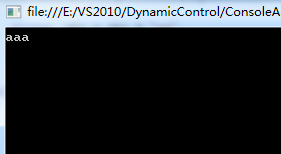原文地址:http://www.cnblogs.com/li-peng/p/3154381.html
整理了一下表达式树的一些东西,入门足够了
先从ConstantExpression 开始一步一步的来吧 它表示具有常量值的表达式
我们选建一个控制台应用程序
ConstantExpression _constExp = Expression.Constant(
"aaa"
,
typeof
(
string
));
//一个常量
//Console.Writeline("aaa");
MethodCallExpression _methodCallexp=Expression.Call(
typeof
(Console).GetMethod(
"WriteLine"
,
new
Type[]{
typeof
(
string
)}),_constExp);
Expression<Action> consoleLambdaExp = Expression.Lambda<Action>(_methodCallexp);
consoleLambdaExp.Compile()();
Console.ReadLine();
|
下边的MethodCallExpression你也许不知道是什么回事,不要急我下边会详细讲的,这相当于
Console.WriteLine("aaa"); 输出一个常量,看一下结果

如果想自己输入一个值输出呢,那就用ParameterExpression 它表示一个参数表达式,我们只要把上边的代码做一下小改动就行
ParameterExpression _parameExp = Expression.Parameter(
typeof
(
string
),
"MyParameter"
);
MethodCallExpression _methodCallexpP = Expression.Call(
typeof
(Console).GetMethod(
"WriteLine"
,
new
Type[] {
typeof
(
string
) }), _parameExp);
Expression<Action<
string
>> _consStringExp = Expression.Lambda<Action<
string
>>(_methodCallexpP, _parameExp);
_consStringExp.Compile()(
"Hello!!"
);
|
参数parameExp就是一个string类型的变量我们让它输出一个Hello!!

有点感觉了吧,慢慢来好玩的还在后边,现在我们就说一下MethodCallExpression它可以调用静态方法和实例方法,我们上边的代码就是调用 的静态方法
,我先讲一下调用静态方法,再讲调用实例方法。
我们建一个返回string的静态方法,传入一个object类型的值
public
static
string
ConsStr(
object
str)
{
string
_str = str +
"aa"
;
Console.WriteLine(_str);
return
_str;
}
|
看一下我们是怎么调用自己的静态方法的
ParameterExpression _paraObj = Expression.Parameter(
typeof
(
object
),
"objPara"
);
MethodCallExpression _MyStateMethod = Expression.Call(
typeof
(Program).GetMethod(
"ConsStr"
,
new
Type[] {
typeof
(
object
) }), _paraObj);
Expression<Func<
object
,
string
>> _meyLambdaState = Expression.Lambda<Func<
object
,
string
>>(_MyStateMethod, _paraObj);
string
s_tr = _meyLambdaState.Compile()(
"ni Hao"
);
Console.WriteLine(
"返回值: "
+ s_tr);
|
 new Type[] { typeof(object) } 就是我们的方法里的参数类型,后边的paraObj是相当于参数值了,如果 是多参数就在 Type[],和后边再加上相应 的类型和参数就行
new Type[] { typeof(object) } 就是我们的方法里的参数类型,后边的paraObj是相当于参数值了,如果 是多参数就在 Type[],和后边再加上相应 的类型和参数就行
静态方法你有些了解了,下面讲一下调用实例方法
我们写一个非静态方法
public
string
ConsStr2(
object
str)
{
string
_str = str +
"aa"
;
Console.WriteLine(_str);
return
_str;
}
|
调用的时候只要把上边的代码改动一点就ok Expression.Call为我们提供了我们想要的重载
Program _pg =
new
Program();
ParameterExpression _paraObj2 = Expression.Parameter(
typeof
(
object
),
"objPara"
);
MethodCallExpression _MyStateMethod2 = Expression.Call(Expression.Constant(_pg),
typeof
(Program).GetMethod(
"ConsStr2"
), _paraObj2);
Expression<Func<
object
,
string
>> _meyLambdaState2 = Expression.Lambda<Func<
object
,
string
>>(_MyStateMethod2, _paraObj2);
string
s_tr2 = _meyLambdaState.Compile()(
"you shi ni "
);
Console.WriteLine(
"返回值: "
+ s_tr2);
|
 简单吧。
简单吧。
再下来我们讲什么呢,也许你猜到了UnaryExpression一元运算符表达式和 BinaryExpression 二元运算符表达式
我们先看一个这两个表达式的简单例子后,我们再做一个复杂的例子
UnaryExpression我们做一个5--的表达式
ConstantExpression _consNum = Expression.Constant(5,
typeof
(
int
));
UnaryExpression _unaryPlus = Expression.Decrement(_consNum);
Expression<Func<
int
>> _unaryLam = Expression.Lambda<Func<
int
>>(_unaryPlus);
Console.WriteLine(_unaryLam.Compile()());
|

BinaryExpression 我们做一个a+b的例子
ParameterExpression _ParaA = Expression.Parameter(
typeof
(
int
),
"a"
);
ParameterExpression _ParaB = Expression.Parameter(
typeof
(
int
),
"b"
);
BinaryExpression _BinaAdd = Expression.Add(_ParaA, _ParaB);
Expression<Func<
int
,
int
,
int
>> _MyBinaryAddLamb = Expression.Lambda<Func<
int
,
int
,
int
>>(_BinaAdd,
new
ParameterExpression[] { _ParaA, _ParaB });
Console.WriteLine(
"表达式: "
+ _MyBinaryAddLamb);
Console.WriteLine(_MyBinaryAddLamb.Compile()(3, 6));
|
 不难吧,
不难吧,
我们做一把两个表达式放一起做一个例子吧 (a+b)*(--c)
ParameterExpression _ParaA = Expression.Parameter(
typeof
(
int
),
"a"
);
ParameterExpression _ParaB = Expression.Parameter(
typeof
(
int
),
"b"
);
BinaryExpression _BinaAdd = Expression.Add(_ParaA, _ParaB);
//a+b
ParameterExpression _paraC = Expression.Parameter(
typeof
(
int
),
"c"
);
UnaryExpression _paraDecr = Expression.Decrement(_paraC);
//(a+b)*(--c)
BinaryExpression _binaMultiply = Expression.Multiply(_BinaAdd, _paraDecr);
Expression<Func<
int
,
int
,
int
,
int
>> _MyBinaryLamb = Expression.Lambda<Func<
int
,
int
,
int
,
int
>>(_binaMultiply,
new
ParameterExpression[] { _ParaA, _ParaB, _paraC });
Console.WriteLine(
"表达式: "
+ _MyBinaryLamb);
Console.WriteLine(_MyBinaryLamb.Compile()(3, 6, 5));
|

今天就讲到这





















 782
782











 被折叠的 条评论
为什么被折叠?
被折叠的 条评论
为什么被折叠?








